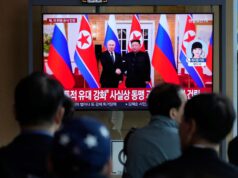How the pandemic and Trump’s art of unpredictability have changed China’s calculations

By
Nirmal Ghosh
The coronavirus pandemic and US President Donald Trump’s mercurial and hardening attitude towards China have changed Beijing’s calculations on its increasingly touchy relationship with the United States.
That China wants Mr Trump to lose the presidential election because it sees him as “unpredictable” – an American intelligence assessment revealed on Friday (Aug 7) – makes sense as tensions grow, with fears increasing of a previously largely theoretical, actual clash with China over Taiwan or in the South China Sea.
Intelligence agencies said on Friday that China and Iran are working to sway US voters against Mr Trump, while Russia is working against Democratic Party opponent Joe Biden, his rival in the Nov 3 election.
For China, until the pandemic, the Trump administration has been a mixed bag, analysts say. The pandemic, coupled with the campaign for election, has shifted the calculus.
Strategically, “China has gotten its gifts and sees diminishing returns from Trump”, Dr Robert Manning, resident senior fellow at the Atlantic Council’s Scowcroft Centre for Strategy and Security told The Straits Times.
“I doubt they have high expectations of Joe Biden, but see the prospect of fashioning a framework for competitive co-existence,” Dr Manning said.
Just as the Covid-19 pandemic triggered a public health and economic crisis that disrupted the election outlook for President Trump, it has also fundamentally changed China’s assessment of the US under him, said Ms Yun Sun, senior fellow and director of the China Programme at the Stimson Centre.
The US-China relationship had, until the pandemic, been framed as strategic competition.
But President Trump and his administration, and the Republican Party, now additionally blame the pandemic on China – an accusation that has become front and centre of the President’s defence of his record in his bid for re-election.
In the Chinese view, although China should carry some responsibility for the early mismanagement of the pandemic, the US’ systemic failure to deal with the pandemic after March is not China’s fault, said Ms Yun Sun.
“For the Chinese, the rapid deterioration and unprecedented political clashes between US and China are by design Trump’s strategy to divert American domestic attention and shift blame.”
Certainly through Beijing’s lens, China has not done anything wrong. Its aggressive “wolf warrior” diplomacy, and the effect of the pandemic in shaping perceptions of China abroad, are not quite taken into account.
China blames the plunge in bilateral relations on the US, tweeted Ms Bonnie Glaser, senior adviser for Asia and director of the China Power Project at the CSIS.
“There will not be improvement in US-China relations until Beijing assumes some responsibility for where we are now,” she wrote.
The tweet was in response to a long, detailed, signed article in China’s state-controlled Global Times by Mr Yang Jiechi, a member of the Political Bureau of the Communist Party of China (CPC) Central Committee and director of the Office of the Foreign Affairs Commission of the CPC Central Committee.
The article is titled “Respect History, Look to the Future and Firmly Safeguard and Stabilise China-US Relations”. Its tone was conciliatory – but firm.
Now, faced with the real fear of a military clash with the US for the first time in four decades, what China prioritises most is stabilisation of bilateral relations, Ms Yun Sun told The Straits Times.
The US also sees the issue through its own lens.
“Although China will continue to weigh the risks and benefits of aggressive action, its public rhetoric over the past few months has grown increasingly critical of the current Administration’s Covid-19 response, closure of China’s Houston Consulate, and actions on other issues,” Mr William Evanina, director of the National Counterintelligence and Security Centre, said in a statement on foreign threats to the 2020 election.
“For example, it has harshly criticised the administration’s statements and actions on Hong Kong, TikTok, the legal status of the South China Sea and China’s efforts to dominate the 5G market. Beijing recognises that all of these efforts might affect the presidential race.”
China has been expanding its influence efforts ahead of November 2020 to shape the policy environment in the US, pressure political figures it views as opposed to China’s interests, and deflect and counter criticism of China, Mr Evanina said.
The conclusion: “We assess that China prefers that President Trump – whom Beijing sees as unpredictable – does not win re-election.”
The Trump campaign, in a brief statement in line with the campaign’s messaging and rhetoric and signed off by communications director Tim Murtaugh, shot back, saying : “The intelligence community’s assessment that both China and Iran are trying to stop President Trump’s re-election is concerning, but clearly because he has held them accountable after years of coddling by politicians like Joe Biden.”
Dr James Carafano, vice-president at the Davis Institute for National Security and Foreign Policy at the conservative Heritage Foundation, has a different view.
“China wants to win without fighting,” he said.
“Trump isn’t interested in escalating conflict. This is manageable on both their parts,” he told The Straits Times.




